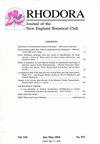康涅狄格州原始森林名录
IF 0.2
4区 生物学
Q4 PLANT SCIENCES
引用次数: 0
摘要
尽管康涅狄格州有350多年的伐木历史,但仍有相当大面积的200多年历史的小而孤立的森林,其中大多数处于原始状态或接近原始状态。这里讨论的三个原始森林群落根据它们的优势树种进行分类:东部红雪松的山脊,东部铁杉的沟壑,以及黑胶的酸性北方沼泽。古老的东部红雪松遍布Metacomet traprock山脊,沿着康涅狄格州中部从北向南延伸。古老的东部铁杉生长在偏远、陡峭的峡谷中,主要分布在利奇菲尔德山和康涅狄格州的西北角。孤立的酸性北方黑胶/红云杉沼泽集中在利奇菲尔德山和安静角(康涅狄格州东北部)的高海拔浅盆地。本文章由计算机程序翻译,如有差异,请以英文原文为准。
An Inventory of Connecticut's Primeval Forests
ABSTRACT Despite Connecticut's 350+ years of logging history, there remains an appreciable acreage of small, isolated stands of 200+-year-old forests, most of which are in their original state or nearly so. The three primary forest communities discussed here are classified by their dominant tree species: ridges with eastern red cedar, ravines with eastern hemlock, and acidic, boreal swamps with black gum. The old-growth eastern red cedars occur throughout the Metacomet traprock ridges, which run north to south along central Connecticut. The old-growth eastern hemlocks are found in remote, steep ravines mostly within the Litchfield Hills and Connecticut's northwest corner. Isolated acidic boreal black gum/red spruce swamps are concentrated in high-altitude, shallow basins in the Litchfield Hills and the Quiet Corner (Northeastern Connecticut).
求助全文
通过发布文献求助,成功后即可免费获取论文全文。
去求助
来源期刊

Rhodora
生物-植物科学
CiteScore
0.40
自引率
0.00%
发文量
40
审稿时长
>12 weeks
期刊介绍:
This peer-reviewed journal is devoted primarily to the botany of North America and accepts scientific papers and notes relating to the systematics, floristics, ecology, paleobotany, or conservation biology of this or floristically related regions.
 求助内容:
求助内容: 应助结果提醒方式:
应助结果提醒方式:


